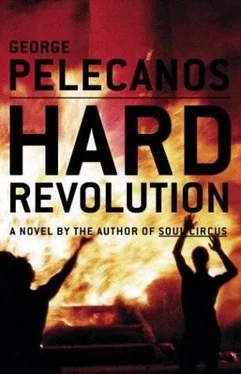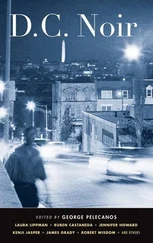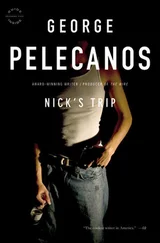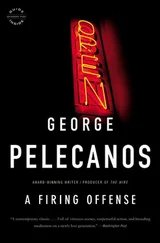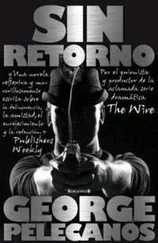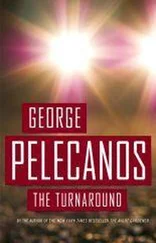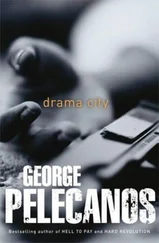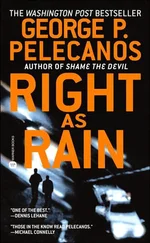Vaughn stepped forward, close to the doorway. From here he could see Ronnie Moses’s apartment on the second floor.
“Make him talk and let him go,” Vaughn had told Strange. “Flash a light in the window if he confesses. I’ll do the rest.”
“Do what?” Strange had said.
Vaughn hadn’t needed to spell it out for the rookie. He would let the young man make the decision himself.
Vaughn dragged deeply on his cigarette.
SOON AS HE had got to the landing, Jones could tell someone had busted through his cousin’s apartment door. It opened, too, with just a little push. Someone had broke into his cousin’s crib, that was plain, ’cause he remembered clearly that he’d locked the door. But Jones reasoned that the break-in was just part of the general mayhem of the day. Kids being kids.
He drew his gun from his slacks just the same. He stepped inside.
Strange came from behind the open door and put his service revolver to the back of Jones’s head.
“Don’t say nothin’,” said Strange. “Let go of that gun and drop it to the floor.”
“Gun could dis charge like that,” said Jones, not moving, not turning his head.
“Do it,” said Strange.
Jones dropped the old revolver. It hit the hardwood with a hollow thud.
“Now move over there to the center of the room,” said Strange, “and turn around.”
Jones obeyed the command. Strange kept the gun trained on Jones and closed the door with his foot.
Jones smiled a little as he turned around and took in Strange.
“Lawman,” said Jones. “Heard you were lookin’ for me.”
Strange said nothing.
“This about your brother, right?”
Strange did not reply.
“I heard he got hisself dead. My cousin Kenneth told me, man. Damn shame.”
“Yes,” Strange heard himself say, looking into the odd golden eyes of Alvin Jones.
“I don’t know nothin’ about it,” said Jones. “I mean, if that’s why you been huntin’ me down, I’m just sayin’… I was with a woman the night he was killed.” Jones chuckled. “The whole night. Bitch would not let me out the bed, you hear what I’m sayin’? I could give you her phone number, you want it. She’ll tell you.”
“I don’t want any phone numbers,” said Strange.
“ What, then? You standing there holdin’ a gun on me. Tell me what you want. I told you I don’t know nothin’, man. I don’t know what else to do.”
Strange stared at Jones.
“If you think I cut him,” said Jones, “you are wrong. It wasn’t me.”
I didn’t say anybody cut him. I didn’t tell Willis he died that way. The newspapers, they didn’t print it… so how could you know?
Strange lowered his gun.
“There you go,” said Jones, smiling. “Now you seein’ things clear. No hard feelings, blood. I can understand you bein’ upset.”
“Get out of here,” said Strange, very softly.
Jones went to the side of the couch, bent down, zipped his duffel bag shut, and snatched it off the floor.
“I’m gone,” said Jones.
He walked toward the front door, eyeing the gun on the floor. Strange shook his head. Jones laughed a little, like a kid, and kept on going, straight out of the apartment. Strange listened to his footsteps on the stairs.
He turned off the main overhead light in the living room. He walked to the window that fronted the street. A naked-bulb lamp sat on a small table near the window. Strange put his finger to the switch on the lamp. He hesitated for a moment; Jones had not confessed, exactly. But he had known that Dennis had been “cut.” Only a few friends, family members, and police had knowledge of that. And the killer. The killer knew.
Strange switched on the lamp, then quickly switched it off.
From the darkness of the apartment, he watched Jones cross the street. He watched Vaughn emerge from the corner market, a small automatic in his hand. He watched him say a few words to Jones in a threatening way, then point him toward the market with the muzzle of the gun. Vaughn stepped aside to let Jones pass inside the market before he followed him in.
Strange heard a popping sound from below, then two more pops right behind it. Light flashed from the market’s depths and briefly illuminated the street.
Strange left the apartment in darkness and walked down the stairs. He exited the row house and headed across the street to an alley entrance beside the market. Vaughn came outside, looked around, and smoothed out his suit jacket. He joined Strange, standing in a patch of black at the edge of the alley. He pulled a wad of cash from his pocket and handed it to Strange.
“Take it,” said Vaughn. “I emptied his pockets and his wallet.”
“I don’t want it,” said Strange.
“Take it. Throw it away or give it away, it makes no difference to me. It’s gotta look like a robbery, so there it is.”
Strange put the money in his pocket.
“It gets easier,” said Vaughn, looking into Strange’s hollow eyes. “Let’s go.”
They walked toward 7th Street. The sirens and burglar alarms grew louder, as did the upraised voices of the soldiers, citizens, and police. As they neared the commotion, they came upon a sewer that was taking in a river of water from the curb. Vaughn drew the cheap.32 from his belt line, wiped it off with his cloth handkerchief, and dropped the gun into the sewer along with the wallet he’d taken off Alvin Jones. Vaughn barely broke his stride.
At the intersection of 7th and P, amid the confusion, the strobing lights, the flames, and the noise, he shook Strange’s hand and broke away.
Vaughn disappeared into the smoke. Strange walked north.
THE CURFEW, AND the presence of more than six thousand armed soldiers, National Guardsmen, and police, brought the city under control. Prisoners in overflowing precinct jails were transferred to facilities downtown. Rioters and looters who had escaped arrest began to return to their apartments, houses, and public housing units to examine their bounty, treat their wounds, and tell tales. A few law-abiding residents came out of their homes, in violation of the curfew, to give food and drink to exhausted firemen and police. For many, it was the first shocking glimpse of the streets and businesses they had frequented every day for most of their lives. The destruction of their neighborhoods had been devastating and complete.
By midnight, the capital of the United States was under occupation by federal troops. Sporadic rioting and civil disobedience would continue through the weekend at a greatly reduced degree, leading to a Sunday of relative peace.
By the end of the weekend, there would be almost 8,000 arrests, 1,200 reported injuries, and nearly 30 million dollars’ worth of damage. Twelve citizen deaths were attributed to the riots. A thirteenth death was listed as a homicide. The body of a man was found in a gutted market near 7th Street, his death the result of close-range gunshot wounds to the head, throat, and chest.
The man was never identified. His killer was never found.
LATE FRIDAY NIGHT, a squad car went up Georgia, along Howard University. It occupants, two veteran white cops out of the Thirteenth Precinct, pulled to the curb, where a big white man in a cheap suit stood talking on the phone in a public booth, the door open to accommodate his bulk. The cop riding shotgun had recognized the man.
“Detective,” said the cop, tilting his head out the window of the Ford. “Everything all right?”
Vaughn put his hand over the receiver. “Just out here solving homicides.”
“You’re behind enemy lines, case you haven’t noticed.”
“I’m undercover,” said Vaughn, and the uniforms laughed.
Читать дальше
